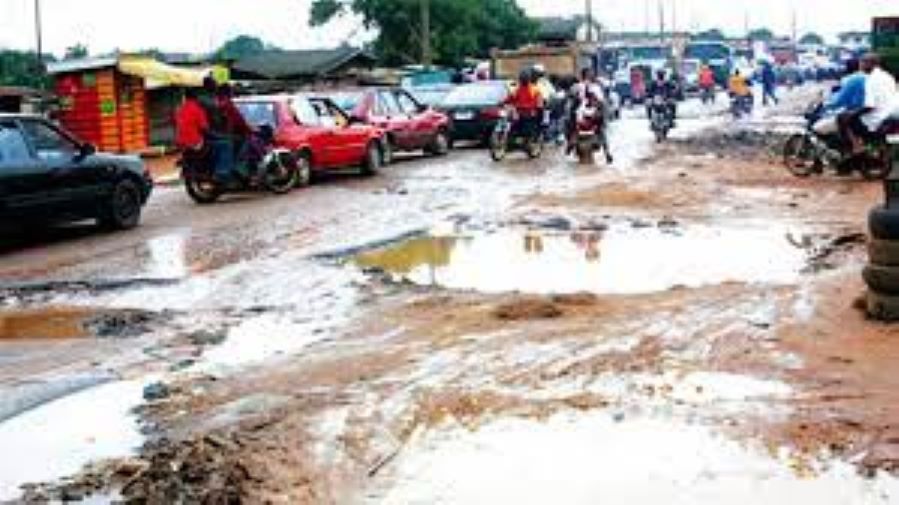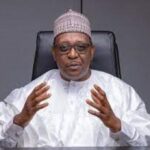By Ben Nwosu & Ndu Nwokolo
A good road network constitutes a major component of the transport system and a critical infrastructure in every society. Critical infrastructures are facilities and services that are inevitable for a society’s basic operations. It would include transport, telecommunications, energy, water, food, healthcare and financial systems in most societies. These infrastructure’s sustainable operation and maintenance is considered an important measure of state capability. While most of these infrastructures are hardly in good condition in Nigeria, the country’s road infrastructure is terribly bad and compels attention.
Nigeria’s road network, estimated at about 200,000 sq km, has only 60,000 sq km paved. Experts suggest that 80 per cent of paved roads are expired, while others suffer different levels of degradation due to bad engineering designs, poor maintenance and environmental factors. Across the country, citizens live under the burden of bad roads, which affects their daily lives and livelihoods. There is hardly an economic or professional activity unrelated directly or indirectly to transportation. Thus, the state of the Nigerian road infrastructure is a common reference point for citizens when they consider the performance of each sitting government. Indeed, the central place of this infrastructure has made citizens forget that water and other critical infrastructures are also neglected.
The poor condition of Nigerian roads is among the common cause of accidents. In the first quarter of 2022, for instance, there were 3,345 crashes on Nigerian roads, out of which 2,199 were serious and about 871 were fatal. In the second quarter of the same 2022, there were 3280 crashes. Serious ones were 2,105, while fatal ones were 823. Economic losses related to bad roads in Nigeria are enormous and estimated at 450 billion Naira annually. Politicians find it expedient to make this much-needed infrastructure an important item of their political promises during electioneering.
The promises of improving infrastructure, especially the roads, are often unmet. Neglects happen at all levels of government on the various roads that they are responsible for.
While it is proper to admit that resources are limited for meeting citizens’ every need, there are cases in which duty bearers have been accused of punitive neglect of road projects because those affected did not give electoral support to sitting regimes. Besides, the road infrastructure costs a lot more than it should, thereby linking the politics of road infrastructure with corruption.
* Politicking with citizen needs Deficit Budgeting, Poor Implementation and Deliberate Neglect
The four roads in Nigeria include the Federal Trunk A road, which is owned, developed and maintained by the Federal Government. Trunk B roads are under the ownership and maintenance of the states where they are located. Trunk C roads are under local government ownership and management. The last is the Trunk F roads, formerly under state ownership but were later taken over by the Federal Government to upgrade to federal highway standards. Each tier of government has the duty to construct and maintain roads that fall within their jurisdiction.
Nonetheless, the funding of all the levels of government draws largely from the federal allocations to other tiers of government. The Nigerian government has not evolved a clear principle about disciplined focus on road project initiation and completion. Thus, the country has multiple abandoned road projects, and the cost of completing them is estimated at about 6 trillion Naira. Unfortunately, the annual budgetary allocation to roads is too small to settle the cost of old projects while new allocations continue to be initiated.
For the 2020 fiscal year, 169.88 billion Naira was allocated to road infrastructure. The road projects listed for the financial year across the country were either partly done or not completed. These include the Sapele-Ewu road, Bida-Lambata road in Niger state, 9th Mile – Orokam road in Enugu state and more. In 2021, the budgetary allocation for road projects was the sum of 460 billion Naira, out of which 30 billion Naira was allocated to the Federal Road Maintenance Agency (FERMA). In 2022, 240 billion Naira was for road infrastructure, whereas outstanding certificates to contractors are valued at 640 billion Naira. According to the House of Representatives’ Chairman on works, it was difficult for the Ministry of Works and Housing to carry out new road projects because their budget was small. In the 2023 budget, the slice of the budget meant for road construction is 175.4 billion Naira, of which 62.2 billion Naira would be spent on road rehabilitation and repairs. Usually, new projects are not completed the year they are initiated, and in subsequent budgets, such projects are abandoned for new ones. For instance, the Onitsha Enugu Road was awarded for 32 billion Naira in 2019. As of late 2022, only 19% of the work was done.
The slow rehabilitation of the Onitsha- Enugu expressway and its persisting disrepair for many years is similar to several other abandoned and unattended road projects across the country. For instance, Abia, Edo, Imo, Anambra, Lagos, Rivers and Benue States were the seven states with the worst road network in the country. The bad roads in these states also include the ones the state and local governments are supposed to do. These states merely reflect what is happening in the entire country. In some cases, certain abandoned roads are so because the residents of the affected areas did not give electoral support to the incumbent government. One instance is the Durumi extension in Chikun Local Government Area of Kaduna State, in which residents accuse the former Governor El Rufai of punitively neglecting them because they did not vote for him.
Regarding the contract award for road construction and maintenance, there exist grounds to be convinced that corruption is yet to abate around public procurement. Contract fees are often not released as of when due. Consequently, contract abandonment happens when inflation hinders the continuity of an awarded road project. This results in the renegotiation of contracts and sometimes the inflation of project costs. For instance, in September 2023, a contractor accused the chairman of the House of Representatives Committee and officials of the Federal Ministry of Works of inflating the contract for the construction of the 41 km Ijebu-Igbo/Ita Ibadan Road from 9.8 billion Naira to 53.3 billion Naira. The contract was originally awarded in 2018 with a completion period of two years. Still, only 15% of the mobilisation fee was paid in instalments over five years (2018 to 2023). After that, the contract was re-awarded to another construction firm at the cost of 53.3 billion without terminating the old contract. What stands out here is the failure of public procurement governance and funding challenges on the part of the government.
* Synthesising the Complexity
Three main factors could explain the problem of road infrastructure in Nigeria. The first is the institutional framework of road infrastructure governance, the second is the funding pattern, and the third is the weak state syndrome. Regarding the institutional arrangement for road infrastructure governance, the government still has a lot of control over contract awards for road construction and maintenance due to its almost total funding of road projects apart from a few built through concession agreements. The government still determines when the road is to be maintained, and often, it allows roads to dilapidate significantly before rehabilitation resumes rather than periodic monitoring and maintenance.
Nigeria can draw from examples of countries like Honduras, Guatemala, Nicaragua, Costa Rica, Armenia and others, which have evolved institutional road management systems. The above countries have designated groups comprising representatives from the government and the private sector in an institutional framework largely autonomous of the government in managing their road funds and infrastructure. Often, road users have a strong representation in the above models of road infrastructure management. Insight could be drawn from the above instances for Nigeria’s federal, state and local roads.
Unlike the countries referred to above, which get their road funds from fuel taxes and road maintenance levies, licenses and fines on overloaded vehicles, Nigeria’s road funds accrue from grants from governments, organised private sector and international donors, toll gate collections, Fees or services rendered by agency and monies accruing from road concessions. These sources do not operate with effectiveness in most of the cases. Thus, managing the funds requires more transparency and greater involvement of direct road users.
There is also the weak state and governance syndrome, which have prevented both road maintenance authorities and road policing agencies like the Federal Road Safety Commission (FRSC) from adequately monitoring vehicles that have exceeded their weight limits and are causing physical harm to the roads. These extra loads exert undue pressure on road surfaces, leading to heavy structural defeats and damage. This behaviour may not be different from other character of the Nigerian state, where the state is weak. As argued by Agbu (2016), “the Nigerian state has been shown not to be a neutral institution; rather, it is an instrument of domination, oppression, primitive accumulation and the protection of elite interests” and therefore, when the law that should protect the road against the excessive weight is not applied due to certain interests and considerations, the end results are that everyone take advantage of such neo-patrimonial loopholes.
* Options for the Improvement of Road Infrastructure
We advance the following options for the enhancement and management of Nigeria’s road infrastructure:
The politics of road infrastructure could be diminished by reconsidering the idea of the so-called Federal roads. Federal roads should be confined to a limited number of important highways like the trans-African highway. The rest should be left to state and local governments. Therefore, revenues collected for road funding should be substantially distributed to the lower levels of the federal government. .
The government should diversify its road funding sources by involving the private sector through road project concession. Under this arrangement, a private sector organisation with a clear arrangement with the government can build and maintain certain roads and recover their funds through toll gates over a number of years. This experiment also happens in parts of Lagos and could be replicated across other parts of the country on selected roads.
A Central Bank of Nigeria study also suggested raising road funds through capital markets by the sale of bonds as against the collection of foreign loans. Also, the tax credit scheme by which the private sector can do some roads under government agreement to offset tax liabilities should be encouraged.
The governments should involve citizens in road infrastructure management in a framework that includes open reporting of damages on roads, monitoring and public reporting of road conditions using ICTs accessible to everyone. Also, such systems should enable citizens to report the pace of work on road construction projects and project abandonments.
Road management committees should be free from undue government interference.
Civil society organisations should be interested in road infrastructure management and support frameworks for citizen participation to have a sustainable system. Community monitoring groups should be supported to operate across states and local governments.
There is a need to establish the equivalence of FERMA in every state and local government and set up an ICT system for reporting issues about roads they oversee. The ICT should be accessible to everyone about reported faults, which the agencies must address and publicly indicate how and when they responded to the reported damage.
Although, there are arguments that Nigeria’s inability to operate an effective rail system, which could have lessened the burden of heavy loads on the road, led to the current failed roads situation, however a proper road management system that regulates and controls the weight of goods each truck or van can carry at a particular run, will reduce the physical damage these vehicles cause to our roads.
There should be strategic efforts at improving our inland waterways so that light vessels can be used for the haulage of heavy goods in the country, thereby reducing the pressure on the roads. Federal and state governments should partner with private businesses ready to invest in that sector.
* Policy Recommendations
There is a need to reconsider the distribution of “federal roads” to include state and local governments.
The government should diversify its road funding sources by involving the private sector through road project concession.
Governments should involve citizens in road infrastructure management in a framework that includes ICT monitoring and reporting.
There is a need for road management committees to be free from undue government interference.
Civil society organisations should be interested in road infrastructure management and support frameworks for citizen participation to have a sustainable system.
There is a need to establish the equivalence of FERMA in every state and local government and set up an ICT system for reporting issues about roads they oversee.
There is a need for a proper road management system that regulates and controls heavy-duty trucks that damage roads.
There should be strategic efforts at improving our inland waterways so that light vessels can be used for the haulage of heavy goods in the country, thereby reducing the pressure on the roads.
* Conclusion
The politics of road contract award, delay in completion, road construction and maintenance funding, and partisan selection of where to start and complete or abandon projects is the bane of Nigerian road infrastructure. Excessive dependence on one source of road funding and excessive hand of the state without including citizen road users in managing the roads need to be reconsidered. It is by addressing these factors that our Nigerian roads could be rescued.
(Dr. Ben Nwosu is an Associate Consultant at Nextier, and Senior Research Fellow at the Institute for Development Studies, University of Nigeria, Enugu Campus; while Dr. Ndu Nwokolo is a Partner at Nextier and an Honorary Fellow at the School of Government at the University of Birmingham, UK)
****
| ReplyReply allForward |



